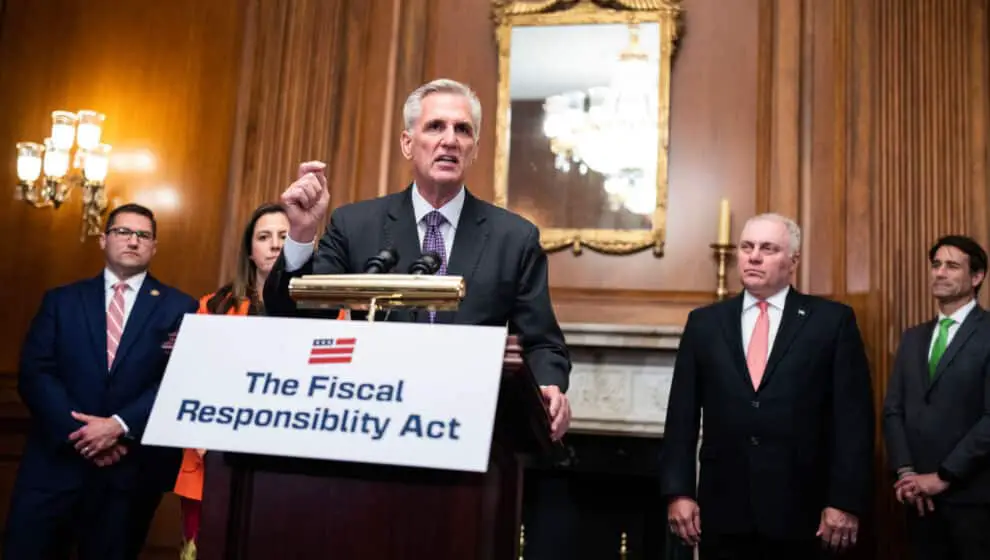Just in time for the June 5 deadline, the U.S. House of Representatives passed a bill raising the debt ceiling in exchange for other spending reductions.
Key Details
- The bill received support from both sides of the aisle, passing with a 314-117 vote before heading to a vote in the Senate.
- Once up for a vote in the Senate, leaders have promised a quick response, and President Joe Biden has stated that he is ready to sign the bill, The Wall Street Journal reports.
- The agreement comes after weeks of stalled negotiations between House Republicans and the White House.
- This bill appears as a victory for Speaker of the House Kevin McCarthy, who held out for spending cuts Republicans demanded despite the White House’s insistence that it would not negotiate.
- Though Republicans had pushed for significant spending cuts, the reality of the agreement is less aggressive than some had wanted.
Why it’s news
After Treasury Secretary Janet Yellen announced that the U.S. had hit its debt limit earlier than expected at the beginning of this year, lawmakers knew they would have to raise the debt ceiling or default on government debt. This could have significantly affected government programs like Social Security and Medicare.
While Republicans are largely counting the bill as a victory, the actual spending cuts McCarthy was able to negotiate are less extreme than many had initially wanted. The Fiscal Responsibility Act will move back the debt ceiling to January 1, 2025. The next debt ceiling debate will not happen until after the next presidential election, The Wall Street Journal reports.
It also reduces some discretionary spending until the next fiscal year and places a 1% spending cap until 2025. However, the final deal does not address larger parts of the U.S. budget, such as Social Security and Medicare spending. Some language in the bill will also move up deadlines on energy projects and place more requirements on food assistance.
Over the next decade, the new bill should reduce the government deficit by around $1.5 trillion, according to the Congressional Budget Office.
The agreement is not only a victory for the Republicans but bolsters McCarthy’s leadership. During the Speaker of the House election, McCarthy faced opposition from several members of his party, enough to delay the final speaker election.
During that election, McCarthy agreed to new rules that would allow any party member to call for a vote for the Speaker to vacate the chair. While the debt ceiling negotiations were mainly focused on the economic effects, McCarthy’s leadership also hung in the balance. However, he now says he is not worried about a challenge for power, The Wall Street Journal reports.
Not every lawmaker is pleased with the decision, however. Some pointed out that the actual bill resembled an April bill used at the beginning of negotiations. The bill also passed with 163 Democratic and 149 Republican votes, causing more concerns among the more conservative GOP members.
“We were told they would never put a bill on the floor that would get more Democrats than ours to pass. We were told that,” Representative Andy Biggs (R-AZ) says. “That’s what just happened.”
Representative Chip Roy (R-TX) opposed the deal and told fellow Republicans, “My beef is you cut a deal that shouldn’t have been cut.”
Progressive Democrats were not pleased either, especially related to the section of the bill addressing energy programs and the new requirements for food assistance programs. While the bill does not affect Medicare and leaves the Inflation Reduction Act relatively unchanged, it does reduce many of the billions initially directed to the Internal Revenue Service.
“I’m going to support the legislation that is on the floor today,” House Minority Leader Hakeem Jeffries (D-NY.) says. “I support it without hesitation or reservation or trepidation, not because it’s perfect. But in divided government we, of course, cannot allow the perfect to be the enemy of the good.”
While Senate leadership has indicated that the bill will be passed swiftly, a few holdouts exist in the Senate. Senators Rand Paul (R-KY) and Mike Lee (R-UT) have said there are some amendments they would require before agreeing to hurry the bill through the Senate. If Senators cannot reach an agreement, the bill’s final passage could be delayed until June 6—one day passed the deadline.
“I cannot stress enough that we have no margin—no margin—for error,” Senate Majority Leader Chuck Schumer (D-NY.) says. “Either we proceed quickly and send this bipartisan agreement to the president’s desk, or the federal government will default for the first time ever.”
